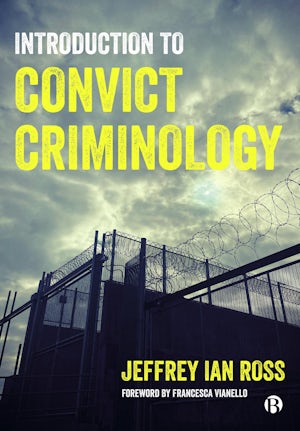

Convict criminology (CC) is based on the belief that the convict’s voice has been traditionally ignored or marginalized in scholarship and policy debates, and that its inclusion can positively impact the fields of corrections, criminology, criminal justice, and policy making.
Designed for students, scholars, and activists worldwide this is the first sole-authored book to comprehensively explain the CC approach to scholarship, teaching, mentorship, and prison and criminal justice activism. It reviews the history and scholarship on this engaging field and the challenges that the approach has encountered. It features:
• exhibit boxes
• keywords
• test questions - including multiple choice, short answer and essay format.
- Price: $41.95
- Pages: 222
- Publisher: Bristol University Press
- Imprint: Bristol University Press
- Publication Date: 30th April 2024
- ISBN: 9781529221206
- Format: Paperback
- BISACs:
SOCIAL SCIENCE / Penology
SOCIAL SCIENCE / Criminology
SOCIAL SCIENCE / Sociology / General
“As part of a robust criminological education as well as more applied political projects, this foundational text provides a vital and accessible perspective on how to critique and resist the carceral logics of domination.” Jessica Bird, University of Illinois at Chicago
“This sophisticated analysis of the core ideas of convict criminology from one of the founding scholars in that field represents a real coming of age for one of the most exciting movements within criminology.” Shadd Maruna, President of the American Society of Criminology
Foreword - Francesca Vianello
Introduction
Part 1: Introduction and Scholarship
1. Getting Up to Speed with Convict Criminology
2. What Is the History of Convict Criminology?
3. What Kinds of Scholarship Have Been Conducted on Convict Criminology and by Convict Criminologists?
Part 2: Teaching and Mentoring
4. Teaching Convicts and Formerly Incarcerated Individuals: The State of Post-Secondary Undergraduate Education in Correctional Facilities
5. Mentoring Convicts and Formerly Incarcerated Students
6. How Has Convict Criminology Engaged in Mentoring? Collaboration with Convicts and Formerly Incarcerated People on Scholarly Research
Part 3: Activism and Public Policy Work
7. What Is Prison Activism?
8. How Has Convict Criminology Engaged in Activism?
9. What Does the Future of Convict Criminology Look Like?
Convict criminology (CC) is based on the belief that the convict’s voice has been traditionally ignored or marginalized in scholarship and policy debates, and that its inclusion can positively impact the fields of corrections, criminology, criminal justice, and policy making.
Designed for students, scholars, and activists worldwide this is the first sole-authored book to comprehensively explain the CC approach to scholarship, teaching, mentorship, and prison and criminal justice activism. It reviews the history and scholarship on this engaging field and the challenges that the approach has encountered. It features:
• exhibit boxes
• keywords
• test questions - including multiple choice, short answer and essay format.
- Price: $41.95
- Pages: 222
- Publisher: Bristol University Press
- Imprint: Bristol University Press
- Publication Date: 30th April 2024
- ISBN: 9781529221206
- Format: Paperback
- BISACs:
SOCIAL SCIENCE / Penology
SOCIAL SCIENCE / Criminology
SOCIAL SCIENCE / Sociology / General
“As part of a robust criminological education as well as more applied political projects, this foundational text provides a vital and accessible perspective on how to critique and resist the carceral logics of domination.” Jessica Bird, University of Illinois at Chicago
“This sophisticated analysis of the core ideas of convict criminology from one of the founding scholars in that field represents a real coming of age for one of the most exciting movements within criminology.” Shadd Maruna, President of the American Society of Criminology
Foreword - Francesca Vianello
Introduction
Part 1: Introduction and Scholarship
1. Getting Up to Speed with Convict Criminology
2. What Is the History of Convict Criminology?
3. What Kinds of Scholarship Have Been Conducted on Convict Criminology and by Convict Criminologists?
Part 2: Teaching and Mentoring
4. Teaching Convicts and Formerly Incarcerated Individuals: The State of Post-Secondary Undergraduate Education in Correctional Facilities
5. Mentoring Convicts and Formerly Incarcerated Students
6. How Has Convict Criminology Engaged in Mentoring? Collaboration with Convicts and Formerly Incarcerated People on Scholarly Research
Part 3: Activism and Public Policy Work
7. What Is Prison Activism?
8. How Has Convict Criminology Engaged in Activism?
9. What Does the Future of Convict Criminology Look Like?

